.
.

.
When asked to name the song that best represents their expectations for 2025, respondents often cited songs of protest and of the civil rights era, but so were songs of optimism and appreciation, including Bob Thiele and George David Weiss’ composition “What a Wonderful World,” made famous by Louis Armstrong, who first performed it live in 1959. It was originally released by ABC Records as a single in 1967 but was not especially popular in America until it was featured in the 1987 film Good Morning Vietnam.
.
.
_____
.
.
“And now we welcome the new year. Full of things that have never been.”
-Rainer Maria Rilke
.
.
_____
.
.
Greetings, and Happy New Year, from Portland, Oregon:
…..2024 is now over. Enough said.
…..What are your hopes, anxieties, expectations for 2025? How do you see it playing out?
…..At the end of 2020 I invited readers of Jerry Jazz Musician to share their experiences with that difficult year by answering this question:
What one song best represents your experience with 2020?
…..The result was a page that I very proudly published – more than 50 individual respondents that not only included their song selection, but a paragraph or two (and even the occasional poem) about that year. (Click here if you’d like to view it).
…..So, with the advent of major change once again upon us, I thought I would revisit the idea and change it up a bit, this time looking forward.
…..A few weeks ago I invited many of the writers, poets and artists who frequently contribute to Jerry Jazz Musician to consider the following question:
What one song best represents your expectations for 2025?
…..It’s a challenging question, and one that I discovered from the respondents was taken quite seriously.
…..Prior to distributing the invitation, I considered this question for a week or two and after listening to many song candidates (given my mood they were mostly songs of protest) concluded that Roberta Flack’s recording of the Donny Hathaway/Leroy Hutson composition “Tryin’ Times” best represents my own expectations for the upcoming year. Recorded in 1969, the song expresses the inequality and injustice of the time, and includes a call to action of sorts:
“People always talk about man’s inhumanity to man,
But what are you trying to do to make this a better land?”
…..“Yes,” I asked myself, “what can I do to make this a better land?”
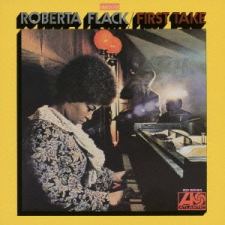
“Tryin’ Times” is from Roberta Flack’s 1969 Atlantic Records album First Take
Click here to listen to the song
…..“Tryin’ Times” is also a reminder of the complex challenges of that era – the struggle for civil rights, the Vietnam War, the “generation gap” that divided families, assassinations of prominent leaders, and political corruption among them. Not exactly a “great” time in America, but it was an era that included struggles that eventually led to a measure of hard-fought social progress in the ensuing years that, in my view, a large portion of fellow Americans will be working to reverse this year.
…..So, I chose this song because I see the coming year as a struggle – of political, social, and cultural chaos – that demands a call to action to do what I can, in my own way, to make this “a better land.” My first step in this process is to shut down the news and lower the temperature of the personal heat that rises when I watch it. I will no longer let the political madness voiced by small men inhabit such a large space of my psyche. Instead, I hope to put my energy toward doing what I can to take part in the community around me – to hang more with friends and family, to walk and exercise and travel, and to talk less and listen more. Simply put, I hope to better appreciate the gifts that life offers. Probably sounds like a new year’s resolution, but it feels more like a ticket to personal survival.
…..What follows are the contributions of many creative artists from all over the world, each naming their selection (in any musical style or genre, and from any year) and, in most cases, describing it in a paragraph or two, or in a poem – often written specifically for this feature. All viewpoints were welcome.
…..Due to the length of this post, biographies of each contributor are limited to their names, their role as contributor to Jerry Jazz Musician, and the city in which they live. By clicking on their name, readers will be taken to a list of posts on which their work has appeared, and where more complete biographies can be found.
…..At the end of each participant’s contribution, readers can click on the italicized song title and be taken to a YouTube page where a full version of the song may be enjoyed. Additionally, a Spotify playlist that includes all available tracks is embedded at the conclusion of this feature. The result is a “musical quilt” of sorts, a diverse array of meaningful songs that represent readers’ expectations for 2025.
…..I wish to thank everyone who chose to participate in this exercise – the writers, of course, but also the readers, who I invite to share their own choice in the comments section at the conclusion.
…..I hope you enjoy…and best wishes for the coming year.
Joe Maita
Editor/Publisher
.
photo by Rhonda R. Dorsett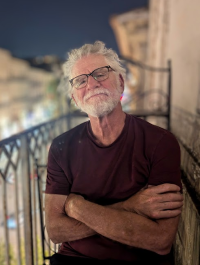
.
.
_____
.
.
“What one song best represents your expectations for 2025?”
.
.
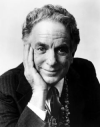
David Amram, musician, composer; West Camp, New York
.
…..I choose Woody Guthrie’s “Pastures of Plenty”
…..Woody wrote many songs that transcended greed, racism, ego-mania and fashion and all these years later, the word “migrant” in this song is a reminder to the USA of who we were as well as who we still are.
…..The pride and dignity that these workers had in 1941 when this song was written celebrates the pride and dignity that these “migrants” still have today. Our children are fed fresh vegetables because of the immigrant community that works in our fields, and provides us with food that is not processed.
…..This has nothing to do with who is in charge of the White House or Congress or which political party is in charge at the moment. We all have to eat and we all have to learn to respect the remaining family farmers and those who still pick the crops that nourish us.
…..Woody’s classic song tells this story in a way that seems as relevant today as it was in 1941. His protege Pete Seeger told me that Woody believed that for the bird to fly successfully, it must have its left and right wings work together in harmony.
,
I worked in your orchards of peaches and prunes
I slept on the ground in the light of the moon
On the edge of the city you’ll see us and then
We come with the dust and we go with the wind*
.
.
*lyrics by Woody Guthrie
.
.
_________
.
.

Marsha Hammel, artist; North Carolina
.
…..Interesting that you have sent out this invitation to name the music best to describe the year 2025. Today in my studio I pulled out an old album, The Best of Mose Allison, and grooved along with every song. The song that I chose from all of those great tracks is” I Don’t Worry About A Thing ‘Cause Nuthin’s Gonna Be Alright.” A poet and philosopher as well as a fine jazz pianist is that Mose Allison. I miss him.
.
.
.
__________
.
.
photo by Herman Leonard
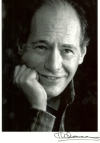
Gary Giddins, writer; New York, New York
.
“Didn’t It Rain / Just a Closer Walk with Thee”
Sister Rosetta Tharpe, Mahalia Jackson plus Louis Armstrong
.
…..The last time Joe posed this question, back in the Magic Mountain covid-confined year of 2020, when optimism was still possible, I answered with Ellington’s solo piano version of “New World a Coming.” Four years later, summoning optimism is a struggle. The first title that came to mind was “A Hard Rain’s Gonna Fall,” but rain also reminded me not of the cataclysm to come but one already endured: “Didn’t It Rain,” and the miraculous quality of Black spirituals to acknowledge the worst and feel the best. Two versions, filmed live and YouTubed, are elixirs for any time in any year: Sister Rosetta Tharpe (who enters with an intoxicating strut) performing by railroad tracks in 1964; and Mahalia Jackson at the Newport Jazz Festival in 1958.
…..The combination of Mahalia and rain reminded me of a more personal experience, and sure enough, it too is YouTubed. On May 4, 1970, the air was sucked out of our lungs by the massacre of four students at Kent State (eight members of the Ohio National Guard who acted as if they were at a Duck Shoot were charged on a Civil Rights statute and acquitted). Two months to-the-day later, I stood toward the back at the Newport Jazz Festival’s birthday celebration for Louis Armstrong (11 months before his passing), as it began to rain, and Mahalia Jackson took the stage wearing a wig that had a life of its own, paid tribute to Louis, and sang “Just a Closer Walk with Thee.” A few umbrellas and tarps went up, but I saw no one run for shelter. As she finished, an elated Armstrong came on and brought her back. Prepare yourself for the sublime, despite an untimely cut-off.
.
Didn’t it Rain, by Sister Rosetta Tharpe
Didn’t it Rain, by Mahalia Jackson
Just a Closer Walk with Thee, by Mahalia Jackson (with Louis Armstrong)
.
.
__________
.
.

Connie Johnson, poet; Los Angeles, California
.
…..I don’t know that the song that represents my expectations for 2025 has been written yet. What we are experiencing in America today is unprecedented in so many ways. Unless a song’s message is specific to these days, these times and these challenges, how meaningful can it be? Given how optimistic I feel on any given day, I do still appreciate the soulful urging of Donny Hathaway to “don’t let the spin get you down….”
…..Perhaps easier said than done. But at least he beautifully expressed that sentiment on “Someday We’ll All Be Free.”
.
.
.
__________
.
.
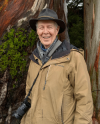
Bob Hecht, writer and photographer; Portland, Oregon
.
…..When he was alive, Charles Mingus never hesitated to express his views about injustice in our society. His “Fables of Faubus” and “Oh Lord Don’t Let Them Drop That Atomic Bomb on Me” are two famous examples of his not pulling a punch (and there are examples of his throwing one or two, too). I can only imagine what he would be feeling these days with overt racism and the increasing loss of democracy on the rise. Would he be composing “The Trials of Trump?” Or perhaps more pointedly, “Grab ‘Em by the Pussy?” You know he would not be quiet!
…..So in thinking about something appropriate to express my own outlook for the year(s) ahead, I reviewed Mingus’s massive oeuvre, especially his blues, and landed on his “Old Blues for Walt’s Torin.” It’s a highly intense, chaotic sounding blues full of dissonant, mournful and argumentative sounds that still, like all great blues, manages to express both beauty and tragedy. From the beauty, perhaps we can glean some hope, though I fear the tragedy will prevail.
.
.
.
__________
.
.

John Zheng, poet and educator; Itta Bena, Mississippi
.
…..While I viewed the photographs of Leo Touchet, a great photographer living in Louisiana, for my poetry writing, I noticed this flower picture titled “Flower, New Orleans, Louisiana 2005, #0673,” which I imagined as a gramophone trumpet. My imagination immediately leaped to “La Vie en Rose” sung by Louis Armstrong because my adopted mother once sang in the Armstrong Band for two years. I listened to the song time after time while composing my poem with the same title. Now I look forward to the blooming of my chapbook when the new year comes.
.
La Vie en Rose
Armstrong’s song
blooms through
a gramophone trumpet
found at Goodwill—
Good old days
hold me close
and hold me fast
and beg me
not to sigh
and say goodbye
and go to a world apart
because life will
always be La vie en rose
as beautiful as a dream.
.
.
.
__________
.
.

Michele Herman, writer; New York, New York.
.
…..A song came to me instantly: Paul Simon’s “American Tune,” part of which borrows its melody from Bach’s St. Matthew Passion (one of my favorite pieces of pop-music trivia). Specifically this part of the lyric:
I don’t know a soul who’s not been battered
I don’t have a friend who feels at ease
I don’t know a dream that’s not been shattered
Or driven to its knees
But it’s alright, it’s alright
For we lived so well so long
Still, when I think of the
Road we’re traveling on
I wonder what’s gone wrong
I can’t help it, I wonder what’s gone wrong.*
…..I’ve actually been hearing this song in my mind for years. It plays each time I try, in my teeny hyperlocal way, to cut back on my consumption. I intone the line For we lived so well so long, knowing that I’ve been the beneficiary of postwar plenty that has to be thought of as an aberration and not the gold standard of how to live as Americans.
…..But now, in the recent aftermath of the 2024 election, other lines are rising to top of mind, some of them in anticipation of what’s on the way: I don’t have a friend who feels at ease. I don’t know a dream that’s not been shattered or driven to its knees. I can’t help but wonder what’s gone wrong.*
…..What can I do? I’ve checked in with many friends who feel even less at ease than I do. I teach memoir to about three dozen brave, crazily resilient writers who have been through hell of one or many kinds, and I know that fiercely supportive communities are the antidote.
.
.
*lyrics by Paul Simon
.
.
__________
.
.
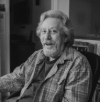
Terrance Underwood, poet; Miami, Florida
.
…..The song: “Across the Borderline,” by Harry Dean Stanton with The Cheap Dates (written by Ry Cooder and John Hiatt)
.
even before the Comanche
the opportunity of the land has
long been the attraction for arrival
routinely encouraged by Upheaval
within places of departure
-T.U.
.
.
.
_________
.
.

Christopher D. Sims, creative writer; Rockford, Illinois
.
Song: “Rebel Without A Pause” by Public Enemy
.
…..Why I chose this song: I have always been a big fan of rap group Public Enemy. In my formative years in high school, Public Enemy and The Autobiography of Malcolm X helped me identify with the struggles of my people, Black people, in ways that were informative, impactful, and educational. “Rebel Without A Pause” is a song that empowers me and moves me to action. As soon as the thumping bassline and Chuck D’s voice hits the track, I feel even more revolutionary.
…..In times like these, where the Orange Monster is in office again starting this January 2025, I feel I will need to be even more revolutionary and action- oriented. Anti-Blackness has increased since his first term in office. The increase of racism – especially by people who follow him and neo-Nazis – has created racist actions in schools here in the United States. Who is going to push back at this racial violence and injustice? Someone has to! I will continue to listen to songs like “Rebel Without A Pause” to receive the push I need to continue what I do as an artist, activist, and leader.
.
.
.
_________
.
.

Ruth Knafo Setton, writer; Allentown, Pennsylvania
.
…..Sam Cooke wrote “A Change is Gonna Come” in 1963, after he and his entourage were turned away from a whites-only motel in Shreveport, Louisiana. This experience, along with hearing Bob Dylan’s “Blowin’ in the Wind,” compelled Cooke to write a song that addressed the struggles of African Americans and the Civil Rights Movement. Every word, every beat in the song is infused with pain. From the experience of writing it to the fact that he only performed it live once.
…..I believe the power and darkness of the song’s emotions scared him a bit—they didn’t quite fit with his image as a crooner. The song didn’t make much of a splash when it was released on his album, Ain’t That Good News, and it wasn’t released as a single until after his death in December 1964.
…..But from that point on, the song’s impact and recognition as an anthem for hope and freedom has continued to grow. The song captures that delicate emotional tightrope we’re all walking as we enter 2025, acknowledging deep systemic challenges while maintaining an unbreakable belief that things can and will improve. It’s about recognizing struggle without being consumed by it. Cooke wrote it during another unsettling period in American history, a time when established structures were crumbling, and something new was struggling to be born.
…..I’ve carried this song in my heart through the years. It’s given me hope during dark periods in my life, when I thought I’d reached the end of the road. Sam Cooke reminds us that hope isn’t passive—it’s an active, courageous stance against cynicism and despair—and that’s the message I’d like to take with me into 2025:
There’ve been times when I thought I couldn’t last for long
But now I think I’m able to carry on.
It’s been a long time coming
But a change is gonna come.*
.
.
*Lyrics by Sam Cooke
.
.
_________
.
.

Ron Maita, podcaster/audio mixologist; Scottsdale, AZ
.
…..Unfortunately I’m not very good at following rules.
…..So…Instead of one song which might best describe 2025, I’ve created a set of music which expresses a collection of thoughts:
Confusion: Marvin Gaye-“What’s Going On?”
Reality: Jelly Roll-“Everyone Bleeds”
Effort: Ray Davies-“Change For Change”
Hope: Electric Light Orchestra-“Mr. Blue Sky“
.
.
__________
.
.

Rhonda R. Dorsett, photographer; Portland, Oregon
.
…..I struggled choosing one song that said what I feel and expect. So I chose a song that combines two of my favorite songs that are at once a protest against the challenges we face and a message of hope that there is still a wonderful world all around us. There is a need for optimism greater than we have ever needed in our lifetimes.
…..My song is Barbra Streisand’s “Imagine/ What a Wonderful World.” In light of all that has been happening and will happen, I believe that we must each keep goodness in our hearts and minds and share that in our small circle of family & friends. We will be like the ripples of the pond, spreading that kindness throughout the world.
“Imagine there’s no countries
It isn’t hard to do…
No need for greed or hunger
Yes, a brotherhood of man*
The colors of a rainbow
So pretty in the sky
Are also on the faces
Of the people strolling by
Such a wonderful world.**
Imagine.”
.
I will enter the year of 2025 with this:
If we can dream it, we can do it.
Together, we can all make a difference
and keep it a wonderful world.
Imagine, just imagine.
.
Imagine/What a Wonderful World
.
*John Lennon
**Bob Thiele/George David Weiss
.
.
__________
.
.

John Menaghan, poet/playwright, Berkeley, CA
.
“A Hard Rain’s a-Gonna Fall,” by Bob Dylan
.
…..When Dylan wrote it back in 1962, it was just a song.
…..When he performed it on September 22, 1962, a month before the Cuban Missile Crisis and 14 months before JFK’s assassination, it might have sounded like a warning.
…..But it was still just a song.
…..In a radio interview with Studs Terkel in 1963, Dylan explained: “It’s not atomic rain, it’s just a hard rain. I mean some sort of end that’s just gotta happen.”
…..It was a song that had been, he felt, misunderstood.
…..Now, at the start of 2025, it feels like a stunningly prescient prediction.
.
.
.
_________
.
.

Molly Larson Cook, writer/artist; Pacific Northwest
.
…..The song that comes to mind over the past many days is not jazz, but definitely bouncy: Matthew Wilder’s “Break My Stride.”
…..As I head off into the wild blue yonder, it’s exactly right for how I see 2025, not just for me but for any of us trying to survive the political crush. We will have to be tougher than ever, more determined, and clear about what we want and how to make it happen. Nothing is going to “break my stride.”
.
.
.
__________
.
.

Matthew Johnson, writer; Greensboro, North Carolina
.
“Rhapsody in Blue” by George Gershwin
…..I don’t remember the first time I heard Rhapsody in Blue by George Gershwin, but in 2024, I learned that it was celebrating its 100th anniversary, which prompted me to learn more about the piece. That digging inspired me to mark that song as the one that best represents my expectations for 2025. Gershwin’s composition emerged during a time of social transformation—between World War I and the Roaring Twenties—when America was caught between old traditions and new freedoms, optimism and uncertainty.
…..Heading into 2025, I feel the country is once again at a similar crossroads to that century of song, where the new year represents both chaos and possibility. The merging of classical forms with jazz in Rhapsody in Blue speaks to inclusion, innovation, and diversity—values I try to integrate into my own life. Despite its energetic, sometimes frantic pace, the piece also has moments of tenderness, reminding me to find beauty in ordinary moments even amidst doubt and unpredictability. As a cautious optimist, I approach the new year acknowledging its challenges while embracing the possibility of growth, joy, and discovery, believing that resilience and hope can ultimately lead to something beautiful.
.
Rhapsody in Blue (1976 video performance of Leonard Bernstein playing piano with the New York Philharmonic Orchestra at Royal Albert Hall)
.
.
__________
.
.

Laura Trigg, poet, grandmother, retired physician; Chesterfield, MO
.
…..There are so many great songs that could be thought of in this context! The first song that I thought of after reading your email was “Ain’t Gonna Let Nobody Turn Me Around,” a freedom song that is based on a spiritual. It has been sung at many civil rights demonstrations, including the sanitation workers strike in Memphis in the 1960’s and the events in Ferguson in 2014, and the lyrics have been adapted to specific situations. There are a number of versions, but I usually hear the voice of Joan Baez when I think about the song. Next, I thought of Sam Cooke singing “A Change is Gonna Come.” Both songs are somber, but they both have a filament of hope for us to grab.
.
Ain’t Gonna Let Nobody Turn Me Around
.
.
__________
.
.

Russell Dupont, author, artist; Whitman, MA
.
…..For most of my life, I think I’ve considered myself an optimist; but, looking down the road, a dark and foreboding future seems to be approaching. I’ve always been a news junkie but these days, I find myself wanting but unable to tune out. The best I can do is to switch to Pandora or Spotify. I fight to keep myself from getting involved on Facebook. And then Joe, our publisher, and I exchanged a few emails and he ended the last of them with, “I am very blessed.”
…..I lay in bed this morning, thinking about that sentence and realizing that I, too, am blessed. For more than sixty years, I have been married to a beautiful, highly intelligent woman. We’ve had three amazing children who, fortunately, inherited her brains. Our children have given us seven grandchildren who have filled my life with joy as I watched them grow and carve out lives for themselves. I now have five great grandsons — the oldest is three years old and and lives close enough that I can chase him and his little brother around the yard — they are faster than I am now and that makes me laugh. I’ve been fortunate enough to have and had good friends. Each morning at the Y, I exchange bad jokes with the guys who have been around about as long as I have.
…..And what does this have to do with the topic — “What are your hopes, anxieties, expectations for 2025?”
…..I was reminded, thinking about all of this, of a piece of music I’ve always loved; a piece of music that pretty much sums up my real feelings; and as soon as I came down stairs, I put on Louis and listened as he reminded me “What a Wonderful World” it is.
.
.
.
__________
.
.

Dave Wakely, writer; London, UK
.
…..My choice would be Tony Bennett and Bill Evans performing “You Must Believe in Spring.”
…..What we must really believe in, of course, is hope, but there are few songs that make that point so well for me: even if the word ‘hope’ never appears in the lyric, it is implicit in every stanza. At the darkest time of year (and 2024 is ending darkly in so many ways), we’re sustained not just by winter staples – by root vegetables, grains and legumes stirred into warming soups and stews, by mugs of coffee or hot chocolate sipped through visible breath outside frosted cafes, by jars of preserved fruits and freezers full of the last harvest. We’re preserved by the knowledge that winter is a stage and not a finality. 2024 has been deeply challenging for the world, and for me personally, and I will be taking this song to heart in the coming weeks.
.
.
.
__________
.
,

Emmett Wheatfall, poet; Portland, Oregon
.
What one song best represents your expectations for 2025?
…..What a wonderful question. An astute question in anticipation of the New Year 2025. The song resounding in my heart and mind is “Water Under Bridges” by the amazing jazz crooner Gregory Porter.
Which song do you choose, and why do you choose it?
…..Life will offer many challenges and disappointments in 2025. With many of them their lingering impact will want to find residence in my life. Being the relational kind of person I am, broken relationships trouble my soul the most. Working through such trouble is never easy. “Water Under Bridges” provides the right exhortation and encouragement.
…..Being a poet, I thought it would be wonderful to record “Water Under Bridges” speaking the lyrics as verse. So, I recorded it. It is receiving positive affirmation nationally and internationally. Gregory Porter’s recording and my cover of his “Water Under Bridges” are available on such online streaming sites as Apple Music, Spotify, Amazon Music, e.g. Here is a haiku derived from the lyrics of “Water Under Bridges.”
it gets easier
cause bridges over water
have already burned
.
Water Under Bridges (by Gregory Porter)
Water Under Bridges (cover) by Emmett Wheatfall
.
.
__________
.
.

Daniel W. Brown, poet; Red Hook, NY
.
“Strength and Sanity,” by Booker Little
……
…..Booker Little was a composer and trumpet player who is sadly little known. He died at age 23 not from drugs or accident but uremia most likely exacerbated by lack of adequate health care. He was a tremendous talent who played often with Max Roach and Eric Dolphy among others. His composition “Strength and Sanity” from the album Out Front seems to suggest in its quiet way that despite personal, societal pain and/or oppression that strength and sanity are one and the same when following your path with kindness and compassion. An excellent theme for the coming year.
My poem for Booker:
Booker’s Trumpet
These empty valves
released the pain of life
pain of illness, pain of strife
pushed by strength of loss
an inward wind
a colossal wind
freed the action
to blow and blow again
bell tone tapestries
so quiet they freed notes
that could lift a soul
that resides in a trumpet
left by a twenty three year old
in 1961.
.
.
.
__________
.
.

Susie Gharib, writer
.
…..Era is a music project that demonstrates in many songs the Cathars’ beliefs. Their song “Divano” sums up in the scene in which scripts and books are burned, a human history of intolerance and persecution. The Cathars were burned alive for having their own unique vision. In 2025, I hope to see an end to fascism, in all its political and domestic manifestations. I hope to see Freedom of Speech and Freedom of Worship, and uncensored creativity as in the final rescue of the music script. I hope to see a union between separated family members and reconciliation between warring nations. I hope to see, as in the baptism of the baby, a new baptism of the world, a rebirth of virtue and ideals, of PEACE.
.
.
.
__________
.
.

Erren Kelly, poet; Waltham, Massachusetts
.
“Not Like Us,” by Kendrick Lamar
.
…..They are not like us, the red caps I sometimes see around Boston, which is mostly a liberal town, built on the backs of Kennedys, still coasting on their legacy. I see them sometimes in Cambridge, which is a sanctuary city, where you can find homeless people on Mass Avenue heading for the soup kitchen, or hustling for a job, or just looking to bum a cigarette. Sometimes, their day comes to that, getting a smoke, trying to feel some kind of freedom, like the red hats, who occasionally walk by. They are indifferent to them. A homeless guy yells at a red hat ” I’d vote for him ” even if he doesn’t have a home. “Better than a whore,” the disheveled guy yells. He is voicing the frustration of many of those who have had enough of empty promises, who are tired of being manipulated. They don’t see that they are being manipulated by the Republicans too, all they want is relief. A woman tells a reporter “we are tired of the Democrats taking us for granted. Every election, they come around promising change, and yet it’s the same: higher rent, higher grocery prices, higher gas.” She works three jobs, and rarely sees her daughter. When she finally does, its a reunion. “I don’t care what anyone thinks of me,” she says. “We are tired or being taken advantage of.” She is going to vote for Trump, even through he is a convicted felon, sexual predator and a pathological liar. She sees him as the best choice for change. I wonder if she knows that it was a Republican who freed the slaves. I hope the irony is not lost on her.
…..I walk around Waltham on my way to a focus group meeting; the neighborhood is nice suburban. Republican. Brandeis University is not far down the road, but I pass by a house with a Trump sign in the window “Keep America Great,” and I just pass by unfazed. These people aren’t like me; they’re white, likely upper to middle class, they have probably never had a hard life. They’ve never gone to a temp agency, and waited hours for a job, which probably won’t pay much, but it will give them enough to survive. They won’t know what it feels like to stand in a soup line, hoping dinner won’t run out. They won’t know what it’s like to be hated simply because their skin is not like the other. These are people who Trump loves; the people who follow him blindly, who hang on every word, who have normalized prejudice and elitism and made it their mantra “go out and get yours, like I got mine.” A man tells a reporter “there’s opportunities out there. Pull yourself up by your bootstraps.”
…..Oh, if it were that simple.
…..You first have to have boots to pull up, and many people don’t have them. They want to pull up their bootstraps, but they have too many felonies. A man can be a convicted felon and become president. An ivy League graduate can kill a CEO and become a hero and become escorted to jail in pageantry worthy of a head of state, but the average felon will get passed over.
…..They are not like the people in Waltham, the red hat crowd. They’re not like us.
…..Another week, and 2024 comes to an end. In a month, Trump takes office again, and the red cap army will celebrate. People will continue drinking the kool-aid and fall under his spell. It amazed me how such a man can have a hold on people; its like a stranglehold. They see this man and cater to his whim; he smiles and they fall to his shtick; “I love the poor and uneducated,” and those are the largest part of the red cap group, his minions, who will never know what it’s like to be a billionaire, who will never be like Elon Musk or Jeff Bezos, and yet the red cap guys say, “he speaks for us, he can relate.” He’s their Champion, the Teflon Don who could care less about them, than he does for the Blacks and Latinos who voted for him. Why should I care about them ? They’re not like us.
…..I won’t watch the inauguration, I will pray and pray hard. I will not hate the red cap people; if anything, I will pray for them. I will not hate the many Blacks and Latinos who crossed over to the dark side. I will pray for them to be well. It really doesn’t make any difference if you’re left or right. But sides will manipulate you. Both sides hold out a carrot on a stick, hoping you will follow it. I will continue to pray and write and fight and dream, and hope that my red cap brothers and sisters will wake up and see Trump for who he truly is.
…..And that we’ll come together and truly be America.
.
.
.
__________
.
.

Robert Miner, poet; Houston, Texas
.
…..“We’ve all had too much sorry, now is the time for joy.” This is the key message delivered in the song “Joy” from Nick Cave’s 2024 album Wild God, a collection of ecstatic songs built on a foundation of tragedy, loss and grief. For Cave, he and his wife have suffered through the loss of two sons and have tried to find a way to continue to embrace life. Although clearly shaped by his own grief, Cave has his vision set on something more universal in “Joy.”
“And all across the world they shout bad words, they shout angry words
All across the world they shout out their angry words
About the end of love, yet the stars stand above the earth
Bright, triumphant metaphors of love
Bright, triumphant metaphors of love
Blind us all who care to stand and look beyond
And care to stand and look beyond above.”*
…..As we enter 2025, still reeling from the losses of the Covid years and struggling to find a way forward to solve the many challenges which divide our country and our world, it is good counsel to embrace joy in our personal lives and in the way we approach the world. This isn’t to say that we should ignore the public sphere but instead remember how many ways we can change the world for the better as individuals engaged deeply with the people in our lives. 2025 feels like a year when so many of us need healing, need solace and need much more joy.
.
.
*Lyrics by Nick Cave
.
.
__________
.
.

Jerrice J. Baptiste, poet; Hudson Valley, New York
.
…..I choose Sam Cooke’s “A Change is Gonna Come” -1963.
…..For the people of Haiti to have hope, strength, resilience in the face of our darkest hour.
My poem is titled “The Hum”
The Hum
I hear the hum.
It grows loud, drumbeat
wakes me in mid-sleep.
I hear their sobs for the land
they had harvested
cacao, sugarcane, plantain.
I hear their voices rising
in the mist
over the solid mountains.
I thank them for calling
my name
daughter of their dawn.
I chant for wings of peace
to spread over our land.
For young sons to listen
to ancient rhythm roaring
in their blood, to know
to nourish but not to destroy.
.
.
.
__________
.
.

Brian Greene, writer; Durham, North Carolina
.
…..When I look ahead to 2025, I see a combination of hope and despair. On the happy side, my partner and I plan to get married during the year. Also, 2024 has been an excellent time in my writing life and I expect that momentum to continue in ’25. But less joyfully, with the election results of this year, I know I’ll spend 2025 living in a country ruled by hateful fascists who oppose all of my political and personal values. Also, both my daughters are struggling with their mental health in this era that is especially hard on young people, and I know they are apt to have difficult life experiences over the year.
…..The song that jumps out at me as the most fitting soundtrack for this mixture of thoughts and emotions is “River of Love” by T. Bone Burnett. Although there’s one stanza that seems to discuss an ill-fated romance and that doesn’t apply here, the full body of lyrics convey a duality of grief and love in the human experience and those twin currents resonate with me, especially as I anticipate what 2025 might be like. Burnett included the track on his self-titled album from 1986, and his ex-wife Sam Phillips (then recording as Leslie) performed an equally sublime version on her ’87 record The Turning.
.
.
.
_________
.
.

Michel Steven Krug, poet/lawyer; Minneapolis, Minnesota
.
…..I’ve really given this much thought and many rock and roll and R & B songs seem appropriate, including “You Can’t Always Get What You Want,” “Sittin’ On the Dock of The Bay,” “Mercy Mercy Me,” “What’s Going On,” and “Get Up, Stand Up.” But I ultimately went with a song/piece that speaks to me of bridging and reinvention. George Gershwin wrote “Rhapsody in Blue” as a reluctant commission, then dashed it off with inspiration and under deadline pressure imposed by booking circumstances. He melded classical music with jazz and some critics felt uncomfortable with the blend. But he was innovating and consolidating, and that’s what I’m feeling coming into 2025. The attached poem, “Resurgent Rhapsody,” responds to that.
.
Resurgent Rhapsody
The overlapping administrations
play competing compositions,
each considering their body of work,
one at an erasure keyboard,
depositions beings scheduled,
brittle laws skitter across driveways
held by the curb. Deadlines pressure,
what will endure, what will be repealed?
I take a drive over the pounding tracts
of yesterday’s freeway, laying down a rhythm
that Gershwin heard when he wrote
Rhapsody in Blue, and I respond
to this turnabout, unflappable era,
atonal, (but not an inventive way)
in response to this latest jazz age,
no rhapsody in blue, rather, red fortissimo.
This rhapsody will melt into purple,
combining elements from all notes,
keys and tempos, a whole new sound
born of improv, a score for the pit,
with a debut in Aeolian like Halls across
the Youtubian land, everyone invited,
everyone reinvented, all variations
return to this new central theme.
.
Rhapsody in Blue (as performed by the Paul Whiteman Orchestra)
.
.
__________
.
.

Mary K O’Melveny, poet; Woodstock, New York.
.
Abdullah Ibrahim “Water From an Ancient Well” or “A Prayer for Our Times” by Vusi Mahlasela
.
…..My expectations for 2025 are that we will need comfort as we confront evil in ways that make taking action on earlier political challenges look “easy” (e.g., opposing wars in Vietnam, Iraq, advancing the struggle for civil rights and racial justice, supporting rights of women and LGBTQ people in US society).
…..Many protest songs came to mind as background for resistance work that will be required of people of good will (e.g., almost any song by Bernice Johnson Reagon’s Freedom Singers; Sam Cooke’s “A Change Is Gonna Come;” Marvin Gaye’s “What’s Going On”) but I feel we will need beautiful music that restores and provides respite in turbulent times. Whenever I need a reprieve from life’s challenges, I find that the music of Abdullah Ibrahim gives me that comfort. Even as he. and other South African musicians like Vusi Mahlasela, confronted apartheid, beautiful music emerged to calm and restore. Ibrahim’s “Water From An Ancient Well.” always conveys solace and serenity. Which we will need!
.
A Poet Contemplates Provocations of a New Year
I want to write a poem
that could change a life
I want it to rear up
the way a Cold Moon does
as it fills December’s sky
widen dazzle chill
I want every word to startle
to singe sting like a face slap
to brand a scarlet stroke
across a cheek like a wry smile
I want my lines to thieve breath
to leave a reader staring at ground
from an aerialist’s height
a mile above the fray
as she ferries a balancing pole
constructed of slanted light
born of sunspots galaxies
constellations of diamond dust
I want my phrases to emerge
from deep within a dream’s center
like Hubert Laws’ airy flute
Ron Carter’s grace-filled cello
piano melodies from Monk and Jarrett
Bill Evans and Jon Batiste
I want to catch a fleeting phrase
before it slip-slides past sight
past memory’s horizon lines
embrace it as it sizzles hides revives
I want each rhyme to be inhaled
fragrant as thyme or cardamom
follow as its aura shapeshifts
to peony lavender rainfall
I want to watch hands curl bend
as if approaching prayer
I want my poem to be a song
that whales will sing at eventide
to silence all commotion
celebrate communal wisdom
I want my message to embrace
a beating heart to mimic snowflakes
as they trace haiku on ice-christened peaks
or waves gracing sand dunes with sonnets
I want to write a poem that bears
sunflower seeds to songbirds
where each stanza opens
like a cherry blossom
I want my ode to settle over
shoulders like a mohair sweater
to brush away stray fears
to taste like deep sweet chocolate
I want each line to be fresh
as water from an ancient well
nothing will be spilled but regret
in my elegy for jubilation
I want my poem to sing surprise
to bring down the weight of all that lies ahead
.
.
.
__________
.
.

.
David Rudd, writer; Bolton, Lancashire, UK
.
…..Sadly, “How Can a Poor Man Stand Such Times and Live?” by Blind Alfred Reed, seems to capture the mood of the times. In four years’ time, it will be a hundred years old, but it remains as current as ever.
…..Unlike earlier songs about inequality (Woody Guthrie’s “This Land is Your Land” or the gospel anthem, “We Shall Overcome”), Reed’s lyric lacks any optimism, which also, unfortunately, resonates with our times, when the gap between haves and have-nots seems wider than ever. Beyond that, nowadays the climate is an added factor against us. It means that most of Reed’s lyrics need little adaptation at all. However, I’ve taken the liberty of adding a couple of verses ‘in the style of’ in order to address more pressing, contemporary issues:
There was a time when lowly folks got by,
Even though we lived like pigs in sties.
Now we’re out on the streets alone,
With nowhere we can call home,
Tell me how can us poor folks stand such times and live?
The sun now beats us on the streets,
And the wind now flays us till we bleat.
The floods are getting higher
As we’re flushed out in the mire,
Tell me how can us poor folks stand such times and live?
.
How Can a Poor Man Stand Such Times and Live?
.
.
_________
.
.

.
…..I chose “All Blues” because it represents the full scale of blues, both painful and joyful, that we are facing. There are dues to be paid in America; we are not who we’ve said we were since our inception; though we have done a lot of good in the world, the opposite is also true. Good and evil are not mutually exclusive.
.
All Blues
Some mornings I awaken to the light of sun
whispering between the blind and the window.
Darkness ascends slowly from the horizon.
Everything is in its place.
Warm bed, soft sheets, musings uninterrupted.
Husband asleep, softly hums his breath song;
The dog crept silently from his crate in dark of night
to the couch where I’ll find him breathing his tune.
Moon wanes; sun rises to welcome the blues.
A shared universe between them. They know their
own song of sleeping and waking. The sky a brilliant
tune of reds and blues, all blues.
The sea, the sky, all blues, all hues. In a field a blue heron
stands serene, waits with patience. A split second movement;
a small rodent, surprised, hangs from the heron’s beak;
a moan of pain, a taste of strife.
A sad refrain for the coming days in America 2025. Blues
the living dues we all will pay: Miles, magus of blues;
Oscar, poet of sea and sky; Nina, voice of rainbows on a fair
summer’s day. All blues, all shades, all hues for you and I.
.
.
.
_________
.
.

D H Jenkins, poet; Wanaka, New Zealand
.
…..I’ve chosen for my song to represent 2025 “Jack Kerouac reading from On the Road to the accompaniment of Steve Allen on piano.” It seems that with the results of last election the US is going backwards to a time when conservative values prevailed: the Eisenhower Era of the 1950’s. Yet, even under that conservative, right-wing government, 1950’s America was alive with Beat poetry and with classic and experimental jazz.
…..Below is a poem that I wrote the day after the election, when an ethical, competent democratic politician lost to an unethical, incompetent republican, who is also a convicted felon.
…..It’s a sad day in America when a corrupt ex-president is somehow legitimately elected; however, those of us who listen to jazz, read and write poetry, know what lasts.
.
Night Journey
“A big iron needle stitching the country together.” – Jessamyn West
A train is streaking along steel rails
like an arrow through the night.
Sleepers buffeted like sheets in wind;
the conductor sways, the engineer ticks
along in his gears.
All across the country western citizens
sleep, drugged in their dreams of money,
Mechanization, freedom of expression,
discontent with taxes; the body relaxes
As a haunting whistle shouts, and cows
moan in their fields, bats break loose
from summer trees.
An awkward moment or two when
the engineer loses track of time and
his mind,
Although he’s been this way before
and the train will glide on
without him,
And it will keep on going all the way
to the far coast, to those
Pacific shores—
before the passengers awake to
what’s happened.
.
Jack Kerouac reading from On the Road to the accompaniment of Steve Allen on piano
.
.
__________
.
.

Salvatore Difalco, writer; Toronto, Canada
.
…..The song that first came to mind as I contemplated the possible state of the USA and the rest of the world in 2025 was Abner Jay’s unheralded number, “I’m So Depressed,” which in addition to the raw and heartfelt refrain, “Oh, Lord, I’m so depressed,” includes such lyrics as, “D’you know why Elephants don’t smoke?” But yes, that was too easy—teeth-gnashing and hair-pulling aside—and I didn’t want to make light of what strikes me as a serious matter, that is, contemplating where the hell all of this is going.
…..I had recently been dipping into Nina Simone’s 1965 album, I Put A Spell on You (recorded after her break from an abusive relationship in 1964), which I’m ashamed to admit I can only take in measured portions—Nina is a delicious but strong cup of coffee. That said, one song that always gets to me and that I listen to repeatedly is her version of “Feeling Good,” originally written by the English composers Anthony Newley and Leslie Bricusse for the musical “The Roar of the Greasepaint – The Smell of the Crowd” (a song since covered by dozens if not hundreds of artists, from Sammy Davis Jr. to Michael Bublé).
…..I’ve always loved the feeling of this song and the feeling it evokes in me, particularly when I’m a little blue. But that feeling such as it is has never been straightforward. At first listen, “Feeling Good” comes off as celebratory and grateful, though perhaps hesitatingly so; but one is quick to note a deeper, grittier, more resonant vibe that I can only describe as momentarily muted despair, or an abiding and irremediable melancholy of the soul given momentary respite. The song, if not entirely joyful, is optimistic, but tentatively so, expressing an appreciation of being alive—with reservations. But despite that, despite its little burrs and sharp edges, it’s still celebratory, it still has that sun warming your face no matter how badly you feel, that sigh of being tinglingly alive:
It’s a new dawn / It’s a new day / It’s a new life / For me / And I’m feeling good.*
…..The song makes perfect sense for a Nina Simone freighted by the racism, domestic abuse, and mental illness of her past, but someone prepared to look ahead and take a moment to relish and even rejoice feeling present and alive. Perhaps a lesson for all of us seeking egress or relief from the pricks, murk, and shackles of our lives.
…..Upon looking more deeply into the song, its context and timing in the original musical surprised me—the character simply called “the Negro” sings it during a triumphant moment—and it shed some light on Nina Simone’s complexity of emotion singing it. Described by one critic as a “booming song of emancipation,” it certainly resonates as such, but it moves me on a more personal level as Nina Simone is never anything but intimate and never too far away from what it means to be at once vulnerable and powerful and beautifully human.
.
.
*Anthony Newley and Leslie Bricusse
.
.
__________
.
.

Henry Wolstat, poet; Boston, Massachusetts
.
…..My song for 2025 is “The White Cliffs of Dover.” I chose that song because I’m basically an optimist. When America entered World War II during its darkest days, it offered hope for the future and Vera Lynn sang it as Britain attempted to survive the blitz. I have that same hope that we can survive our darkest days and come out stronger and more united as a democratic nation. It may take longer but this coming year would be a good time to start.
.
.
.
__________
.
.

Mike Mignano, poet; Ocala, Florida
…..My expectation song for 2025 is “Ain’t No Sunshine” (Bill Withers 1971/Al Jarreau 1979) because my mood is somber due to our nation’s divisive political climate. I resolve to work and pray for a more truthful, honorable and just America.
…..I wrote a poem on the subject which was originally entitled “Seeking Happiness 2025,” but was changed to “Seeking Harmony 2025.” A Harmonious New Year to All!
.
Seeking Harmony 2025
Clubs, lounges, concert halls
In twilight neon bathed
Homespun vinyl, playlists
Evening radio enclaves
Travelers questing burdens rest
From once a frenzied avarice
A bygone century of music
Still evolving intertwined
Blest catalog cascading
A multitude of treasured gems refined
Attuned forgiving consciousness ignite
The sound its own prescribed delight
Earthy vocals harshness quell
Pulsating melodies tranquility sustain
Wonderous portal Eden’s gate
Jazz awaiting entertain
.
.
.
__________
.
.

Holly Peppe, writer; New York, New York
.
…..Your song invitation gave me a good reason to look for hope in music and in the end, this piece gave me the strongest hope for a future when our country and the world might be more unified than divided. The apt title is “Song of Hope” and the performance includes 1400 musicians from 35 countries, aged 6-93. It was the final project of trumpet virtuoso, Ryan Anthony, who died from cancer in 2020. I hope its soaring notes will inspire others too.
.
.
.
__________
.
.
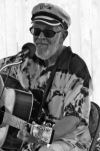
Malcolm McCollum, musician, writer; Colorado Springs, Colorado
.
…..The song I’m choosing is the Adolph Green/Betty Comdon/Jule Stine “Make Someone Happy.” I don’t think I could explain why better than the columnist Margie Whalen did in a recent Quoddy Tides (Eastport, Maine) column: “The idea of ‘essential workers’ has been a topic of conversation in the years since the pandemic forced us to recognize the degree to which we depend on each other. But perhaps ‘essential’ means not just the services provided by medical workers and teachers and those who kept our grocery stores up and running; perhaps just as essential is the kindness that we can offer each other, no matter what our jobs are, during crises and in everyday life.”
…..Whatever is to come this next year, we need to lay down our grievances and hatreds and fears, and remember what made us strong, what makes any collection of people strong – caring for one another. While some of this lyric is the usual romantic, boy-girl goop, a few of its lines offer a great reminder to us: “Fame, if you win it / Comes and goes in a minute / Where’s the real stuff in life, to cling to? . . . . Make someone happy / Make just one someone happy / And you will be happy too.”*
…..I especially choose Jimmy Durante’s recording of this song because Durante spent a lifetime living it, and he left everyone he touched with a little more joy than they’d had before he touched them. In Gene Fowler’s biography, Schnozzola, Fowler quotes Durante saying, ““Success?” Jimmy asked. “Well, I think success is not to worry too much, to do the best you can, stick to your friends, and pray they’ll stick to you.The rest is in God’s hands . . . . You have a dollar. I have a dollar. We swap. Now you have my dollar and I have your dollar. We are not better off. You have an idea. I have an idea. We swap. Now you have two ideas and I have two ideas. Both are richer. When you give, you have. What I got, you did not lose. That’s cooperation. I don’t like the cash system. Maybe we ain’t all born equal, but it’s a cinch we all die equal.”
…..We need to remember that lesson that Margie Whalen said we’d learned so recently: the degree to which we depend on each other. I hope we will start to remember that this coming year, and I hope we start showing others how grateful we are that they’re here with us.
.
.
*Adolph Green/Betty Comdon/Jule Stine
.
.
__________
.
.

Joel Lewis, writer; Hoboken, New Jersey
.
…..My song for 2025 is John Cale’s “Leaving It Up To You,” from his 1975 UK-only album Helen of Troy. It was literally removed by Island Records because of its reference to the murder of Sharon Tate by the Manson Gang by the LPs second pressing; it only resurfaces on a 1977 compilation called Guts. It is an example of proto-punk (Cale was producing Patti Smith’s Horses at the time of the recording) and is pretty scary and disturbing – which may have been the real reason Island removed it.
…..“All the buildings are breaking down/Like the whispering in your heart/And its sordid how life goes on/When I could take you apart”* is a typical stanza in this hymn to inchoate rage. Cale even throws out the insult “fascist” for good measure and his vocals get increasingly out of control as the song proceeds.
…..I feel that this song sort of reflects how many of us feel as we head into who-knows-what-is-up-the-road. “Leaving It Up to You” has remained in Cale’s repertoire and some You Tube clips documenting performances of the song during Cale’s shambolic punk-era period are hard to watch. The version of the song that many know is from Cale’s 1992 solo unaccompanied album “Fragments of A Rainy Season” (which also includes his version of Leonard Cohen’s “Hallelujah” which most covers of that song are based on). This version retains much of the paranoia of the original, though the absence of Chris Spedding’s insistent guitar riff lightens the original’s haunted house atmosphere. If you have a friend who says, “Things won’t be that bad” in 2025, put “Leaving It Up To You” on and leave it on “repeat.”
.
.
*lyrics by John Cale
.
.
__________
.
.

John Hawkins, poet; Oceania.
.
“Long Gone Lonesome Blues” by Hank Williams
.
…..I’m scared about 2025, now that we went ahead and re-elected the felon and sexual predator, DJ Trump. It was his minions, the MAGA element, that was largely responsible for making it electorally viable. For the results of the election are counterintuitive to my sense of eroding reality. I mean, in 2000 Bush very narrowly won the election because of the phony Florida results that had removed thousands of Black voters from the registry because they were “felons.” Had Trump not voted from New York he would not have been allowed to vote for himself from Mar-a-Lago. Where’s my goddamn saxophone?
…..To me, Hank Williams, whose music I listened to often in my childhood, probably to the detriment of my soul, but also without a choice in the matter, represents the MAGA sentimentality, the wish to make America “great” again. Meaning what? No Civil Rights? No equal opportunity? In short, turning back the clock to ugly o’time. There’s a kind of shallow hillbilly feeling to “Long Gone Lonesome Blues.” I mean, what kind of moron must you be to not notice before you jump from the bridge that “the doggone river is dry”? Maybe he was seeing through his tears. But how the heck is he ‘going down in it three times and only coming up twice’ if it’s a dry riverbed? Am I hallucinating?
…..It feels like in 2025 and beyond we are going to have get used to a whole lot of crazy. It feels bad. It’s like at the end of George Orwell’s Animal Farm: pig Napoleon’s in charge, and his MAGA dogs have killed or chased off opposition, including the lefty pig Snowball, and even though Molly’s still putting out, the glue of society, Boxer, has been sent to the rendering facility. I feel queasy for the future frankly.
Has anyone seen my harmonica?
.
.
.
__________
.
.

Patricia Carragon, poet; Brooklyn, New York
.
.
…..In April 2020, when Trump was president and COVID-19 was in full swing, I wrote a poem based on Regina Spektor’s ” The Trapper and the Furrier.” Unfortunately, the lyrics also apply to 2025 with the return of Trump to the Oval Office with his unqualified clowns for his Cabinet. The new disease will be the installment of Project 2025. I expect the eradication of human rights, social services, and more. 2025, and the next four years, will be a battle for democracy.
…..I know I’ve used this same song to describe how I felt about 2020. Sadly, Kamala Harris lost to the con artist, and that song now applies to 2025.
.
My poem written back in April of 2020:
the trapper and the furrier
(inspired by regina spektor)
2020, a strange, strange year
like a time bomb, waiting for breaking news to strike
beasts in filthy cages
pellets and food, pets from puppy mills
children sleep in soiled cages
family separation, asylum still out of reach
dystopian predictions, dystopian facts
big business declares war on its workers
unions, wages, healthcare live at triage
newspeak from the white house
twists failure into praise, fiction into history
our self-proclaimed leader plays mobster roulette
the press, elections, and laws face execution
he gives carte blanche to an alien dressed as the flu
& the sick keep getting sicker
with too many fevers, chills, coughs, and losses of smell and taste
death toll rising, ghost towns replace cities
bodies overflow morgues, the homeless live underground
tests & cures not fast enough
business as usual for corporate generals
2020, a strange, strange year
people shut indoors, waiting, not knowing what to believe
their time bombs, not knowing when to explode
.
.
.
__________
.
.

Michael Zimecki, writer; Pittsburgh, Pennsylvania.
.
“Post-Apocalyptic Blues” by Mary Crowell
.
…..With a president intent on retribution and a citizenry boiling over with rage and resentment, 2025 seems destined to be a bad year.
…..All the songs I initially considered, including Barry McGuire’s “Eve of Destruction,” Creedence Clearwater’s “Bad Moon Rising,” and Leonard Cohen’s “The Future,” match that grim prognosis, but I decided to give the nod to Mary Crowell’s “Post-Apocalyptic Blues,” the concluding track on her Acolytes of the Machine CD. All the tracks on Crowell’s CD are related thematically to the Dungeons and Dragons role-playing game, but none are as guaranteed to kill your buzz as the other candidates on my list.
…..A music educator from Athens, Alabama, Dr. Crowell is a member of “Filk,” a gaming and science fiction community whose name derives from a typo that replaced the “o” in “folk” with an “i.” In 2022, Dr. Crowell was inducted into the Filk Hall of Fame, but she isn’t well-known outside the Filk community. You can find her work on Patreon.
…..Her song, “Post-Apocalyptic Blues,” combines a touch of whimsy with the conviction that the world won’t end as soon as some expect. The song’s refrain, “(Got the) Post-apocalyptic-I-ain’t-got-no-coffee-the-world-is-full-of-zombies blues,” with its insistence on a morning latte, serves as a wake-up call to resist whatever’s coming.
.
.
.
__________
.
.

R. Bremner, writer; Glen Ridge, New Jersey
.
…..“Bridge over Troubled Water” by Simon and Garfunkel, written by Paul Simon, is the song that most captures my feelings about 2024 in the USA, and my hop for 2025. The waters are most definitely troubled, stirred to boiling by partisans on opposite shores of a political divide. On one shore are those who feel frightened and threatened, and hate with vengeance anyone who supported their opponent, whom they label a threat to democracy. On the other shore are the winners, who feared their way of life, their economic survival, and what they thought were undeniable truths were being taken from them. Neither side seems willing to listen, let alone understand, the other. Relatives and former friends now do not speak to each other, some actually hating their once-beloveds. Every day I see this and try to bridge that chasm. I am getting anger and bitterness and sarcasm from both sides, but I’ll keep trying. We can’t go on like this, and I know we don’t want to go on like this. Some of us must be that bridge over troubled water.
.
.
.
__________
.
.

Francis Fernandes, poet; Frankfurt, Germany
.
…..It took me a while to come up with something appropriate as I listen mostly to instrumental music. But then, when the old gears started turning, a lot of candidates presented themselves – for instance, Sarah Vaughan and Clifford Brown’s “I’m Glad There Is You” (for its sheer positivity); Joni Mitchell’s “This Flight Tonight” (taking off, moving, the trepidations of travel); Dave Matthews’ “Sweet” (an optimistic take on growing up); Leonard Cohen’s “The Future” (for its utter bleakness); Schubert’s “Du bist die Ruh” (for peace and warmth). But I finally opted for my favourite jazz vocalist, Youn Sun Nah and her version of Egberto Gismonti’s “Frevo.” The only catch, of course, is that she’s actually scat singing as there are no lyrics per se.
…..The video is of her accompanied by the great Swedish guitarist Ulf Wakenius, famous among other things for his three albums with Oscar Peterson. The two are simply dazzling.
…..I’ve also come up with a short poem to go with the tune:
Frevo
I’m so ignorant and clueless
(like the way I’ve never kissed your lips)
so I look up the word
and find it actually means boiling
not quite the same as fever or fervor
but you get the picture
so let’s go to Brazil this year
I’ve never heard her ocean’s hiss
aside from Egberto Gismonti
whose name alone is music to my ears
(as is the thought of kissing your lips)
so let’s go to Brazil this year
let’s go and dance on her streets
let’s know her sands and ocean’s beat
yes let’s go and bridge this sad abyss
(that keeps me from kissing your lips)
and sing her pulsing, briny melodies
.
.
.
__________
.
.

Bernard Saint, poet; U.K.
.
…..My choice is the deeply romantic version of “Come Rain or Come Shine” specific to Gerry Mulligan and Concert Jazz Band, as played on the Live in Paris 1960-62 album (and elsewhere).
…..As all romantic songs it may also be read in parallel as ‘spiritual’ in nature – ‘I’m with you always’ and suggests a ‘Strength beyond hope and despair’ as T. S .Eliot lyricised. There is a resilience in its tenderness should the future bring what it will.
…..Romantic love does not stand still but, at best, moving outward can transform and determine its surroundings, neighbourhood, and even country and history. If the ‘Creator’ is ‘love’ then love is a verb as well as a noun.
…..Gerry contributed 7 of the 12 ‘Birth of the Cool’ recordings and a similar transformative magic is at work here – a miniature concerto of jazz harmony, blues, and soul.
…..At the turn of the year I am more given to reverie than revelry and so remember finding this music when I worked across several London hospitals, always ensuring my route paused at one of two independent jazz record shops along the way – both had a coffee shop next door and here you met other enthusiasts and musicians from different generations and countries – all with the common bond, common humanity of ‘our’ music whose insights we shared.
…..How could world leaders then and now choose to overlook such a Symposium of warmth and wisdom?
.
.
.
__________
.
.

debora Ewing, oracle; Annandale, VA
.
…..I’ve tried to think about this several ways but keep coming back to the same answer: The song I choose is one I co-wrote, and it hasn’t been studio-recorded yet.
…..2024 has been onerous. I felt like a cicada in larval stasis, just lie low and wait for the right season to surface. Inner tension unable to release. Like a very long highway through several states, sure you’re making progress but damn if it doesn’t all look the same. I wrote a line: How do you deal with this endless plateau?
…..And another line came after that, and another. I wanted to convey how weak I felt against the onslaught. I’m paper-thin and the monsoon is heavy. And I thought about that highway again, having driven many of them, deciding when to pull over and pee or stick it out to the next rest stop. How far down the road to the next water well?
…..I sent off the lyric to my writing partner, Bill Goodell, who made a few word changes and brought it to his writing partner, John Gates. I love their arrangement.
…..Here’s where the story takes a side-trip at the fortune cookie.
…..A most unusual cookie fortune said: GOOD THINGS ARE IN STORE FOR YOU – not unusual, but there was a date. So I stuck that date in my calendar, just in case. Bill posted the Gates & Goodell arrangement of How Far Down The Road on Facebook, and it got 1000 views in 24 hours. We’re used to about 200. A few days later it was up around 5000 views – and guess what day it was? Yes, the date from my cookie fortune!
…..I don’t think 2025 is the right season to come out of stasis, either. I’m almost frozen in place just waiting to see which hype will be carried out by the next government administration and which will be just hype. Which plague is coming next. I wanted to be over this feeling in 2025, but I’m keeping my head down. Laying low, making no heavy decisions, not burning down anything. Just quietly working, making little scratches where I can work safely.
…..But there will be water down the road…just don’t know how far.
.
.
.
__________
.
.

Jeff Dingler, writer; Atlanta, Georgia
.
“This is America,” by Childish Gambino
.
…..In light (or darkness?) of Trump’s return to the White House, I’m reminded of Childish Gambino’s chaotic yet classic “This Is America.” Released in 2018 (amid Trump’s first term), the song is a messy call-and-response of upbeat poppy verses clashing with a harder rap chorus, declaring ominously: “This is America / Don’t catch you slippin’ now / Look at how I’m livin’ now / Police be trippin’ now / Yeah, this is America / Guns in my area.”*
…..On its own, it’s difficult to absorb the song. But play the music video and be prepared to watch one of the most beautifully damning critiques of American culture, replete with gun violence, vandalism and police surveillance. Midway through, Gambino murders a traditional Black chorus with an AK-47 that’s then ferried away in red velvet, symbolizing our elevation of violence and weapons over American values. And amidst all the abandoned cars, protestors and police cruisers, the video is infused with the most incredible dancing—Gambino shirtless and gyrating wildly throughout, indicating that even as we burn down in civil strife and totalitarianism, we’ll be dancing through it all, looking the other way for the next distraction or good time. Yeah, this is America.
.
.
*Childish Gambino/Ludwig Goransson/Young Thug
.
.
_________
.
.

Antoinette F. Winstead, writer; San Antonio, Texas
.
.…..My song choice represents not my expectations for 2025, but how I choose to face 2025, which I expect will be a trying and difficult year. My song is “Let It Be” (1970) by the Beatles, which sums up how I intend handle 2025. Not apathetically, but prayerfully, in faith that “there will be an answer” to the chaos and madness that defined 2024.
…..I’ve spent the last few months of 2024 in emotional turmoil, internalizing the national and international chaos that seems to have reached a zenith. It feels as if the world has fallen into a pandemic of madness from which there seems little hope of emerging. But, as history shows, this is not the first time, nor will it be the last. And as in times past, the world always manages to rise from the ashes — of whatever fire storm some madman has ignited – wiser and, often more compassionate.
…..If anything, these last few months have taught me that while I have no control over the world’s current state, I can control how I respond, which is why “Let It Be” will be my 2025 anthem. As Paul McCarthy sings:
When I find myself in times of trouble, Mother Mary comes to me
Speaking words of wisdom, let it be
And in my hour of darkness she is standing right in front of me
Speaking words of wisdom, let it be
…..And that’s exactly what I intend to do, “let it be” trusting that “there will be an answer,” of which I will hopefully be a small part.
.
.
.
__________
.
.

Sean Murphy, writer. Washington, D.C.
.
“Focus on Sanity,” by Ornette Coleman
.
i.
This poem is the “closer” from my recent—and third—collection Kinds of Blue, and it explores the exact moment that a burgeoning interest became an obsession that would profoundly alter my life, for the better. Certainly, it celebrates jazz music and my love affair with this form of expression, but it’s also nostalgic in, I hope, all the right ways in that it evokes that indescribably special time of life some of us are fortunate to have, where we’re exposed to all sorts of influences (cultural, political, artistic, etc.) and, if we’re lucky or smart enough to be sufficiently humble and curious, incorporating new ways of thinking and feeling into our still-unformed minds and souls.
ii.
The Shape of Jazz To Come
I still remember everything about it. Fall semester, senior year. The more I learned at college, the more I understood how little I knew. Something, obviously, was working. I was prescient, or just plain lucky enough to sign up for an elective called “Introduction to Jazz.” We’d gone through the century, decade by decade, and it got better as we went. Yes, Bebop was what I’d been missing all along without realizing it. But it was what came next, the more formless expression that started creeping out of the margins—like lava oozing through ancient stones—that portended obsession. Those names: Mingus, Monk, Miles. And then, as we tackled the topic of “free jazz,” a dissident with the audacity to name an album The Shape of Jazz to Come: Ornette Coleman, the canary in the post-bop coal mine. Like all iconoclasts, initially greeted with indifference, then disgust, then fear. His compositions scoffed at convention, freak flags flying out of the underground into the avant-garde. I still remember how quiet the room was and how concerned my ears got: What is this? Like something I’d never heard or felt; a new language, a new sensation, a new way of seeing everything, that first amoeba slithering onto shore, nothing I’d ever known and all the things I now knew I needed. How is it possible, I thought, to make instruments scream in agony and shriek in joy, at the same time? I walked around campus after, the autumn sky all schizophrenic yet serene with colors. And those notes I couldn’t get out of my head. This is it, I thought. This is music. This is addiction. This is love. This is the first day of the rest of my life.
iii.
It’s easy for me to discern, now, that these were formative years in ways that still impact my day-to-day life and the sensibility I’m still shaping, but I was keenly aware, then, that something way below the surface, a force both actual and spiritual, was speaking to me, and I had a choice: listen, and follow, or turn away in fear. I let my ears guide me, and began to understand that the ears lead to the heart, which pumps blood into the guts, and it’s by heeding this historical impulse that things change forever, one moment or interaction or song at a time. All politics is local, and to help and/or heal the world, one needs to start at home: we’ll be needing as much focus and sanity as we’re able to offer and receive–and while I fully intend to do my part, I’ll need fuel & inspiration, and I can’t think of a better mission statement as theme song than Ornette’s call to arms. No one is coming to save us. But the artists will be, as always, on the front lines. They always have been. Here’s hoping we can find their work (everything up until this moment; everything going forward) consoling, inspiring, empowering. It’s up to us to create the type of world we want to have; always has been, always will be.
,
.
.
__________
.
.

Anita Lerek, poet; Toronto, Canada
.
Rhapsody 2025
-after jazz piece, “We don’t even know where we’re headed,”
part of album, The World is on Fire, by Isaiah Collier and the Chosen Few
1.
Chick-a-dee-dee-dee.
Such tiny balls of fluff,
genetically pinned to winter forests,
surviving in bands,
protecting, foraging, chattering
together.
Following nature’s code,
flitting from branch to branch,
making shivering trees sing.
we don’t even know where we’re headed*
Hey, what happened with Nevaeh Crain.
Pregnant teen, Texas,
sepsis, miscarrying.
In three hospital waiting rooms,
waiting for fetal demise, mother’s
organs failing, lips ‘blue and dusky’,
mother and fetus dead,
sounds erased.
2.
we don’t even know where we’re headed
we don’t even know where we’re headed*
The music starts slow; soft voices.
Piano utters each note, then black and white
tongues coalesce into a rhapsody.
Hey, what happened at the Aima kosher café, Brooklyn.
“Jewish people are evil,’’ yelled a pink hoodie
to a customer having breakfast with his young child.
“I think Hitler was onto something.”
Hateful sounds firing.
3.
we don’t even
we don’t even
we don’t even
know*
Bird trilling, the tenor sax blows,
riding energy from the air, mixing the wind’s messages
in his body, sending out breaths of longing and ask.
Hey, what happened with Colt Gray, age 14, in Georgia.
A history of reported home beatings, ejections, and taunting.
Caught searching online for ways to murder his father.
His mother was imprisoned for a family violence offence.
Grade 8. Colt did not attend a single day of middle school.
Grade 9. August 1, started at Apalachee High School.
Complained of panic attacks and fears of his teachers.
Sept 4, he shot eleven people, killing two students and two teachers.
Who heard anything else?
we don’t even
we don’t even
we don’t even
know*
Let us follow the shaman saxophone.
Pressures of breath and revelation,
he blows through humanity’s pain, cracks—
to sweet voices, to fee-bee-bee-bee,
chickadees, nuthatches, kinglets,
black-capped, red-breasted,
golden-crowned mixed flocks,
infinite riffs of primordial song,
in ecstatic rhapsody,
following nature’s code,
together at last.
.
.
*Lyrics (in italics) by Kennedy Banks
.
.
__________
.
.

Geer Austin, poet; New York, New York
.
…..I immediately thought of Barry McGuire’s recording of the P.F. Sloan song “Eve of Destruction,” a piece I haven’t heard for years. It’s an anti- war song from the Vietnam era, but here are some lines from it that apply to now:
“If the button is pushed there’s no running away / there’ll be no one to save with the world in a grave”
“Yeah my blood’s so mad feels like coagulatin’ / I’m sitting here just contemplatin’ / I can’t twist the truth, it knows no regulation.”
“Hate your next door neighbor but don’t forget to say grace / And … tell me over and over again my friend / you don’t believe / we’re on the eve / of destruction.”*
.
.
*P.F. Sloan
.
.
__________
.
.
A Spotify playlist that includes all available tracks mentioned in this feature
.
.
___
.
.
Click here to read the feature “What one song best represents your experience with 2020”
.
.
Click for:
More poetry on Jerry Jazz Musician
“Bluesette,” Salvatore Difalco’s winning story in the 67th Jerry Jazz Musician Short Fiction Contest
Information about how to submit your poetry or short fiction
Subscribe to the (free) Jerry Jazz Musician quarterly newsletter
Helping to support the ongoing publication of Jerry Jazz Musician, and to keep it commercial-free (thank you!)
.
___
.
.
Jerry Jazz Musician…human produced (and AI-free) since 1999
.
.
.
.
.


































Love, love this feature, a work of art of its own. Thanks, Joe. And thanks to all the diverse, inspired minds and hearts that contributed. It will take me years to get through it all lol. Maybe long enough to also get me through the new/old regime. 🎈🕯️
I am so impressed by the intelligence and creativity and diversity of these submissions. I will spend more time with it and listen to the songs (most I am familiar with). Well done, Joe!
Thanks, Jan. What song would you choose?